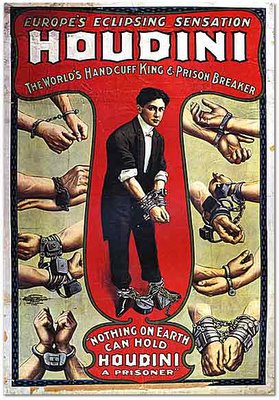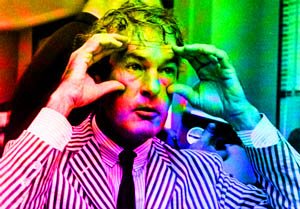
What’s the difference between a showman and a show-off? Anyone who’s worked in a circus can instinctively tell them apart. The showman is motivated by a desire to entertain and enlighten his audience. He will often put their pleasure before his own comfort and safety. “The show must go on” is his motto. The show-off, on the other hand, wants to be worshipped by his fans – he is a man of fragile ego who needs the adulation of the crowd for his own self-esteem.
Some people regard Harry Houdini as a show-off who needlessly exposed himself to danger in order to court celebrity. They are wrong. Although Houdini performed feats that appeared to be magical, he never claimed to have supernatural powers. Before he died, he published a book explaining how he carried out most of his stunts. To his last breath he remained a man of science, committed to a rational investigation of life’s mysteries – which is why one of his favourite hobbies was debunking the claims of spiritualists.
I admit having a personal axe to grind here. When I was in the circus, one of the clowns claimed to be a spirit medium and held a few séances for certain members of staff. I asked the fellow, as a joke, whether he could get in touch with a deceased uncle of mine – a gorilla thought to have perished in the Congo during the gala banquet of a crocodile convention. He invited me into his trailer, sat down with his eyes shut and began to hyperventilate like a pregnant camel.
“Oh yes, GB!” he sighed. “I can feel your uncle’s presence.”
“How is he?” I asked in wide-eyed anticipation.
“He’s very happy and eating plenty of fruit,” spake the clown, nodding wistfully.
“Could you ask him whether he was killed by crocodiles in the Congo?”
The clown moaned and grimaced like a constipated goat. “He did get eaten, GB, but he’s put that incident behind him. One of the crocodiles has since joined him in the spirit world and apologized for devouring him.”
My reaction to this piece of intelligence could be described as the gorilla equivalent of raising one’s eyebrows. I’m all for forgiveness and reconciliation, but a repentant crocodile is a behavioural anomaly that amounts to a contradiction in terms. Curious about what the blighter would say next, I made one final inquiry:
“How does my uncle spend his spare time in the spirit world?”
The clown stretched out his arms and huffed a little more. “He says he climbs up trees and swings from the branches.”
“Well send him my love and tell him I’m glad that he’s conquered his fear of heights,” I remarked dryly as I walked out of the trailer.
The clown’s knowledge of wild gorillas clearly owed more to Hanna Barbera than Dian Fossey, and the man’s performance destroyed whatever faith I had in characters who claim to communicate with the dead. I pity the humans who have fallen for such tosh.
Returning to the subject of Houdini, it is evident that the spiritualists of his day were a lot smarter than that goofy clown. Many of them could make various spine-tingling things happen during their séances and quite a few prominent humans, such as Arthur Conan-Doyle, believed them to be authentic. But Houdini knew better. He showed that most of these “supernatural” occurrences could be reproduced with the aid of a ball of string, some dry ice and a well-trained cat. A lot of people, including Conan-Doyle, fell out with him as a result, but Houdini felt duty bound to expose these shallow tricksters.
The one black mark against Houdini concerns the manner of his premature death. It seems that he had a policy of allowing a fan to punch him in the midriff before his act. Demonstrating your bodily resilience is all very well, but an alpha male should not make a habit of allowing some young scallywag to sock him in the gut. It sends out the wrong kind of message and risks upsetting the social order. Even we male gorillas, who have very hard torsos from all the chest-thumping we do, would never dream of allowing anyone to take such a liberty. No man or beast has ever punched my belly and lived to tell the tale.













